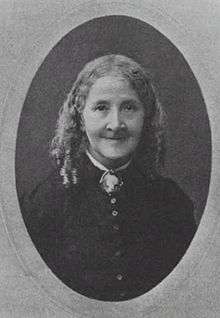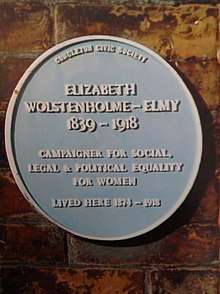Elizabeth Clarke Wolstenholme Elmy
Elizabeth Clarke Wolstenholme Elmy (1833–1918) was a British feminist women's suffragist campaigner, essayist and poet, who also wrote under the pseudonyms E and Ignota.

Early life
Elizabeth Wolstenholme was born in Cheetham Hill, Manchester and baptised on 15 December 1833 in Eccles, Lancashire where her father was a Methodist minister.[1] She was the daughter of Reverend Joseph Wolstenholme who died around 1843 much of her formative years were spent in Roe Green with her maternal family. Her mother Elizabeth had died when she was very young and she was brought up by her stepmother Mary (née Lord).[2] She attended Fulneck Moravian School for two years but was not permitted to study further. Her brother Joseph Wolstenholme (1829–1891) became a professor of mathematics at Cambridge University. She opened a private girls' boarding school in Boothstown near Worsley and stayed there until May 1867 when she moved her establishment to Congleton in Cheshire.
Campaigning
Wolstenholme, dismayed with the woeful standard of elementary education for girls, joined the College of Preceptors[3] in 1862 and through this organisation met Emily Davies. They campaigned together for girls to be given the same access to higher education as boys. Wolstenholme founded the Manchester Schoolmistresses Association in 1865[4] and in 1866 gave evidence to the Taunton Commission into education, one of the first women to give evidence at a Parliamentary Select Committee. In 1867 Wolstenholme represented Manchester on the newly formed North of England Council for Promoting the Higher Education of Women. Emily Davies and Wolstenholme quarrelled over how women should be examined at a Higher Level[5] and Wolstenholme who had formed the Manchester branch of the 'Society for the Promotion of the Employment in Women' in 1865[6] was keen for a curriculum aimed at developing skills for employment whereas Davies wished for women to be taught the same syllabus as men.
Wolstenholme founded the Manchester Committee for the Enfranchisement of Women (MCEW) in 1866[7] and became a vigorous campaigner for women's suffrage for more than 50 years. She gave up her school in 1871 and became the first paid employee of the women's movement when she was paid to lobby Parliament with regard to laws that were injurious to women.[8] Nicknamed 'the Scourge of the Commons' or the 'Government Watchdog' Wolstenholme took her role seriously. When local women's suffragist groups faltered following the disappointment of failed Suffrage Bills, Wolstenholme was instrumental in maintaining the Manchester committee's momentum with a re-grouping in 1867 under the name Manchester Society for Women's Suffrage.
In 1877 the women's suffrage campaign was centralised as the National Society for Women's Suffrage. Wolstenholme was a founding member (with Harriet McIlquham and Alice Cliff Scatcherd) of the Women's Franchise League in 1889.[9][10] Wolstenholme left the organisation and founded the Women's Emancipation Union in 1891[11]
Women's Emancipation Union (WEU) 1891–1899
Formed after the court of appeal's decision to allow Mrs Jackson to be at liberty and not be detained by her husband who was demanding restitution of his 'conjugal rights' commonly known as the Clitheroe Case.
Funded by benefactor Mrs Humphrey Carpenter and subscriptions it was a campaign group that pioneered cross class collaborations encouraging women's resistance to authority as long as their right to vote remained unacknowledged. Also, advocated making women's suffrage a 'test question' in the selection of potential parliamentary candidates [12]
The WEU had four key principles:
- Equality of right and duty with men in all matters affecting the service of the community and the state;
- Equality of opportunity for self-development by the education of the schools and of life;
- Equality in industry by equal freedom of choice of career;
- Equality in marriage and in paternal rights.
The WEU committee held an annual conference and there were 10 local organisers in cities from Glasgow to Bristol, international subscriptions of over 7,000 and they over 150 public meetings between 1892 - 1896. A short-lived Parliamentary subcommittee was established in 1893. Executive members included Mona Caird, Harriot Stanton Blatch, Charles W Bream Pearce husband of Isabella Bream Pearce and treasurer was Caroline Holyoake Smith. Members include Lady Florence Dixie, Charlotte Carmichael Stopes George Jacob Holyoake Isabella Ford worked on behalf of the WEU at outdoor rallies in London's East End in 1895 [13]. The WEU is starting to be recognised as a forerunner to the combative 'militant' WSPU [14]
Papers included Amy Hurlston's 'The Factory work of Women in the Midlands' in March 1893, William Henry Wilkins The Bitter Cry of the Voteless Toiler also in 1893 and Isabella Bream Pearce Women and Factory Legislation' in 1896.
Following the Local Government Act 1894 the WEU worked both to encourage women to stand for election in bodies of local administration to which enfranchised and women to vote. Over a 100 of the WEU organisers were elected as Poor Law Guardians or Parish Councillors.
Following the death of their benefactor and a halving of their subscription in the slump following the loss of the 1897 Women's Suffrage Bill, the WEU folded. The final meeting was held in 1899 where the speakers included Harriot Stanton Blatch and Charlotte Perkins Gilman [15]
WSPU
Wolstenholme, a friend and colleague of Emmeline Pankhurst, was invited onto the executive committee of the WSPU[16] and wrote an eyewitness account of the 1906 Boggart Hole Clough and Women's Sunday where she was honoured with her own stand. Wolstenholme resigned from the WSPU in 1913 when its violent activities threatened human life. Wolstenholme became vice-president of the Tax Resistant League in the same year and gave her support to the Lancashire and Cheshire Textile and other Workers' Representation Committee formed in Manchester during 1903 headed by Esther Roper.[17]
Wolstenholme was not a single issue campaigner and wanted parity between the sexes. She became secretary to the Married Women's Property Committee from 1867 until 1882 when the organisation was disbanded after its successful campaign to introduce the Married Women's Property Act 1882.[18] In 1869, Wolstenholme invited Josephine Butler to be president of the Ladies National Association for the Repeal of the Contagious Diseases Acts that successfully campaigned for the repeal of the Acts in 1886. In 1883 Wolstenholme worked for the Guardianship of Infants Committee that became an act in 1886.
Personal life
Wolstenholme met silk mill owner, secularist, Republican and feminist Benjamin John Elmy (1838 - 1906) when she moved to Congleton and he became her soulmate and domestic partner. Benjamin Elmy was born in Rochdale in Hollingsworth to Benjamin John Elmy Senior an Inland Revenue Officer and Jane Ellis [19]. Working as a Schoolmaster in his early 20s [20] Elmy lost his faith and became a factory manager in Lancashire's textile trade [21]. It was Elmy's work in the textile trade that gave him insights into economic hardships that beset women workers [22]
In 1867 Wolstenholme and Elmy set up a Ladies Education Society that was open to men. Elmy became active in the women's movement joining Wolstenholme's committees. Wolstenholme began living with Elmy in the early 1870s as they jointly followed the free love movement horrifying their devout Christian colleagues. When Wolstenholme became pregnant in 1874, her colleagues were outraged and demanded that the couple marry against their personal beliefs. Despite Wolstenholme and Elmy going through a civil registry office ceremony in 1874, Wolstenholme was forced to give up her job in London.
The Elmys moved to Buxton House, Buglawton and Wolstenholme gave birth to their son Frank in 1875. Although comfortably off by the standards of the day, the Elmys were by no means rich and Wolstenholme home schooled their son Frank.
Wolstenholme spoke out against the Free Trade Law that was crippling the silk trade in Congleton. In 1886 Elmy was elected as Master of the Congleton Lodge of the Fair Trade League and both Wolstenholme and Elmy was popular speakers at Fair Trade League events [23] Elmy and Co ceased trading in 1888 and Elmy retired due to ill health in 1891[24]. In 1897 Elmy started the first Male Electors League for Female Suffrage.
The couple remained married until Elmy's death in 1906.
Wolstenholme died on 12 March 1918 and her funeral was held at the Manchester Crematorium.
Wolstenholme's achievements were recognised during her lifetime but she has since often been sidelined or even written out of histories of the women's movement.
Works
A prolific writer, Elizabeth Wolstenholme-Elmy wrote papers for the National Association for the Promotion of Social Science, articles for the Westminster Review as Ignota, Shafts and national papers. Pamphlets concerning her campaigns also published by organisations like the Women's Emancipation Union.[25] The most significant of her writing are the 'Report of the Married Women's Property Committee: Presented at the Final Meeting of their Friends and Subscribers' Manchester 1882. 'The Infants' Act 1886: The record of three years' effort for Legislative Reform, with its results published by the Women's Printing Society 1888. 'The Enfranchisement of Women' published by the Women's Emancipation Union 1892.
The British Library hold Elizabeth Wolstenholme Elmy's papers and those of the Guardianship of Infants Act and the Women's Emancipation Union.[25]
Also a writer of poetry Elizabeth Wolstenholme wrote 'The Song of the Insurgent Women' on 14 November 1906 and as Ignota 'War Against War in South Africa' 29 December 1899.[25]
Posthumous recognition

A blue plaque was erected for her at Buxton House, Buglawton by the Congleton Civic Society; it reads, "Elizabeth Wolstenholme-Elmy 1839–1918 Campaigner for social, legal and political equality for women lived here 1874–1918".
Her name and image, and those of 58 other women's suffrage supporters, are etched on the plinth of the statue of Millicent Fawcett in Parliament Square, London, unveiled in 2018.[26]
A charity Elizabeth's Group[27] was set up in her home town of Congleton in Cheshire in 2019 to raise her profile and is fundraising to create a statue in her memory.[28]
References
Notes
- Crawford (2003), p. 225
- Stanley Holton, Sandra (2004), "Elmy, Elizabeth Clarke Wolstenholme (1833–1918), campaigner for women's rights", Oxford Dictionary of National Biography (online ed.), Oxford University Press, retrieved 26 February 2015 (subscription required)
- Wright (2011), p. 43
- Wright (2011), p. 60
- Wright (2011), p. 65
- Wright (2011), p. 55
- Wright (2011), p. 62
- Wright (2011), p. 71
- Wright (2011), p. 137
- Holton (2002), p. 76
- Wright (2011), p. 152
- Wright
- Wright
- Wright Maureen
- Wright
- Wright (2011), p. 190
- Wright (2011), p. 185
- Wright (2011), p. 177
- Birth Certificate
- 1861 Census return
- The Radical Life of Benjamin J Elmy (1835 - 1906 by Maureen Wright published in the Journal Gender & History
- The Radical Life of Benjamin J Elmy (1835 - 1906 by Maureen Wright published in the Journal Gender & History
- Wright
- Wright
- Wright (2011), p. 251
- "Millicent Fawcett statue unveiling: the women and men whose names will be on the plinth". iNews. Retrieved 25 April 2018.
- "Home". Elizabeth Clarke Wolstenholme Elmy. Retrieved 3 March 2020.
- Law, Dr Kate (1 March 2020). "'Elizabeth's Group: Bringing a Heroine to Life' By Dr Maureen Wright, University of Chichester and Susan Munro, Chair, Elizabeth's Group, Congleton, Cheshire". Women's History Network. Retrieved 3 March 2020.
Bibliography
- Crawford, Elizabeth (2003), The Women's Suffrage Movement: A Reference Guide 1866-1928, Routledge, ISBN 1-135-43402-6
- Holton, Stanley (2002), Suffrage Days: Stories from the Women's Suffrage Movement, Routledge, ISBN 9781134837878
- Wright, Maureen (2011), Elizabeth Wolstenholme Elmy and the Victorian Feminist Movement the Biography of an Insurgent Woman, Manchester University Press, ISBN 9780719081095
- Wright, Maureen (2014), A Man '[a]s dark as the Devil himself': The Radical Life of Benjamin J Elmy, Secularist, Anti-Eugenicist and 'First Wave' Feminist in Britain (1838 - 1906), Gender & History, ISSN 0953-5233